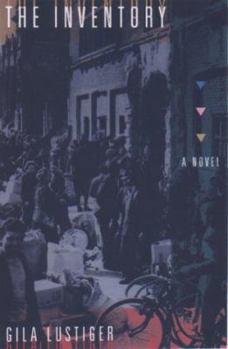The Inventory
Select Format
Select Condition 
Book Overview
Hailed by Der Tagesspiegel as a work "of contemporary necessity", and following in the tradition of Victor Klemperer's Diaries, The Inventory is a profoundly unsettling novel about the sweeping and... This description may be from another edition of this product.
Format:Hardcover
Language:English
ISBN:1559705493
ISBN13:9781559705493
Release Date:January 2001
Publisher:Arcade Publishing
Length:294 Pages
Weight:1.40 lbs.
Dimensions:1.1" x 6.4" x 9.6"
Customer Reviews
2 ratings
evocative, unsettling, but choppy exploration of Holocaust
Published by Thriftbooks.com User , 22 years ago
One of the challenges facing novelists who use the Holocaust as a central theme of their fiction is finding focus and thematic coherence. As the deliberate, horrific destruction of European Jewry during World War II fades in historical immediacy, that catastrophic event tends to be blended with other human-made disasters of the past. This dilution of the Holocaust's profound destruction results in a faceless quality to genocide; it becomes just another mass murder of the blood-drenched twentieth century. Gila Lustiger deserves praise for her determined attempt to put a human face on inhuman mass murder in her engaging, evocative but frustrating "The Inventory." At its best, Lustiger's novel is a brilliant kaleidescopic work of art; it is multifaceted, psychologically challenging and desperately perceptive. At its weakest, "The Inventory" reads like a shattered mosaic; one senses the art behind the writing but is unable to discern direction and meaning. "The Inventory" is neither a character study or a narrative-driven novel. Instead, the very core of this work is the Holocaust itself; the event itself looms as the thematic thread which ties together over thirty otherwise disjointed short stories. Victims, perpetrators and bystanders have names, faces and their own histories, but no one character dominates. Instead, Lustiger assembles an extraordinary cast, from working-class Germans to wealthy Jews, whose sole purpose is to illuminate how and why this genocidal murder could take place. The author's answers unearth no new discoveries, but her conclusions are at once irrefutable and distressing. Mass murder occurred because most Germans either hoped it would or did not care if it would come to pass. Nazi dictatorship, as brutal and comprehensive as a police state could become, accomodated (and did not create) Jew hatred in Germany. Betrayal, denunciations and removal afforded economic opportunities; moral behaviors, including compassion and defiance, atrophied. That Lustiger could accomplish her examination of the Holocaust through a collection of broadly interrelated short stories is a considerable literary achievement.Yet, other writers have tackled this approach to the Holocaust with better results. For instance, Marcie Hershman's "Tales of the Master Race" reads with more coherence and equal power. Nevertheless, Gila Lustiger's novel has moments of absolute brilliance. Her account of a German divorce proceeding, which resulted from "the purchase of a silver-plated powder compact from a Jewish store as a marital offense," demonstrates the degree to which Jew-hatred had saturated German society in the late 1930s. The evocative story of Ernst Fuchs humanizes the despair, degradation and self-doubt victims encountered during the decade of deliberate anti-Jewish laws and actions. Her concluding short stories clearly are written in the crucible of anguish and sorrow.Despite its disjointed, fractured format, "The Inventory" is a suc
An extraordinary and unforgettable novel
Published by Thriftbooks.com User , 23 years ago
It's one am, and I should be sleeping, but I just finished The Inventory and am unwilling to let it go. This novel was one of the most powerful I've ever read... In precise, even stark, language, Lustiger captures and personalizes the tragedy of genocide. Yet The Inventory is not about the experiences of one person, or one family, or one town: rather, it strives to portray the immensity of all that was lost in the Holocaust. Reading this novel hurts; it brings you into a world that you don't want to be a part of, that you don't want to imagine or understand. Yet, for that reason, I believe that it's an incredibly important book. If you find The Inventory as compelling as I did, you may also want to read Micheline Marcom's Three Apples Fell From Heaven, an equally powerful examination of the Armenian genocide.






